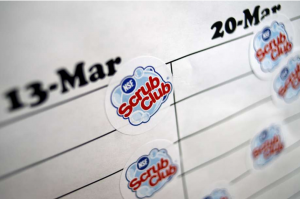Just in time for the Holidays – the special Brevis Handwashing Mug Holiday Pack. This price will make Santa Blush. Our regular price is $120, but today though the end of the year, they are only $84.
Hurry, this price will expire 12/31/2017!
Just in time for the Holidays – the special Brevis Handwashing Mug Holiday Pack. This price will make Santa Blush. Our regular price is $120, but today though the end of the year, they are only $84.
Hurry, this price will expire 12/31/2017!
Germs are everywhere. In optimal conditions a virus can divide every 20 minutes, spreading rapidly where they dwell. In fact, contamination of a single doorknob can lead to the spread of viruses throughout an office building or hotel in as little as two hours.
Researchers from the University of Arizona, Tucson, placed a tracer virus on commonly touched objects such as a doorknob or tabletop. At multiple time intervals (from two-to-eight hours) the researchers sampled a range of surfaces including light switches, bed rails, countertops, sink tap handles, and push buttons. And guess what? Nearly 60 percent of the surfaces were contaminated within two-to-four hours.
“If we placed a tracer virus on the push plate to an office building, it ended up on almost 50 percent of the high-touch surfaces of officer workers’ hands within four hours,” says study author and microbiologist Charles Gerba, PhD. “In the case of the hotel, we placed the virus on the nightstand in one room, and it was spread to the next four rooms by the maid during cleaning.” Also, the first item to become contaminated in the workplace was the coffee pot handle. Other contamination hot spots are phones, computers, and desktops.
Of course, our own bodies play host to around 100 trillion microbes that together weigh more than two pounds. They are present on our skin, in our guts, in the crooks of our elbows, and just about everywhere else. Your immune system protects against most microorganisms, but there are hundreds of thousands of different kinds of germs, and some of them are good at mutating into things your body doesn’t recognize. And they make you sick.
To get an idea of just how many microbes we carry—and which ones spread fastest—researchers are even testing our most intimate possessions: our cell phones. In a small study, University of Oregon scientists tested the index fingers and thumbs of 17 subjects, along with the touchscreens of their smartphones. As you might expect, they found an 82 percent overlap between the most common types of bacteria found on participants’ fingers and on their phones.
So your cell phone is covered with a personal bacterium cocktail? Clean it with a soft cloth dampened with water and wipe it down, or use a disposable wipe made specifically for cleaning electronic screens. Use a cotton swab to get the dirt and grime out of small nooks in the phone. The same goes for all of your other gadgets, too, including remote controls, headphones and ear buds, your computer keyboard, mouse, and tablet screen.
Yes, the war on germs is in your hands. Handwashing is the number one way to prevent the spread of germs and illness. Just make sure you’re doing it right. Friction (especially between the fingers) and duration—20 seconds with running water—are both important. And anything your hands touch are carriers. Learn all about handwashing here.
Here’s something else to think about: On average, an office desk has 400 times more bacteria than a toilet seat. It’s not surprising; the toilet is cleaned regularly. And remote controls, computer keyboards, phones, and iPods get touched way more than the toilet. Multiple coworkers and guest also share them—yet they are cleaned less often. You can find component-specific cleaning supplies at electronics stores. However, most disinfecting wipes are safe for electronics—just make sure to read the label before using them.
This one seems obvious, but how often do you walk around your home or office and wipe off doorknobs, cabinet handles, and light switches? You really should give them a once-over using disinfecting wipes—and don’t use the same wipe for more than a few places before grabbing a fresh one.
It’s easy to keep things clean. Soap and water. Bleach and water. Disinfecting wipes. Common sense. With these simple weapons, the battle against germs can be won. But the first step is you. Now go wash your hands!
Attention gardeners! New research shows that washing your hands after gardening can help protect you from a common but dangerous strain of Legionnaires’ disease.
Legionnaires’ is a severe form of pneumonia, and those most at risk are older adults, smokers, and people with weakened immune systems. Most people with Legionnaires’ disease have contracted it by inhaling a bacteria called legionella. Untreated, the disease can be fatal.
Legionella longbeachae is the culprit strain in this case, a bacteria found in soil and compost products (homemade compost excluded), according to a study out of the University of Otago in New Zealand.
“We recommend gardeners avoid breathing in compost or potting mix, by opening bags away from the face and keeping it close to the ground when moving it around. Also, always wash compost/potting mix off hands before putting them near the face,” says epidemiologist and Associate Professor Patricia Priest.
Further research is needed for more conclusive information, but in the meantime, it’s important to remember that washing your hands after gardening is a smart thing to do, even if you’ve been wearing gloves.
Sources:
https://medicalxpress.com/news/2017-06-gardening-legionnaire-disease.html
http://www.mayoclinic.org/diseases-conditions/legionnaires-disease/home/ovc-20242041
Last October, a hospital in India claimed their place in the Guinness Book of World Records for hand washing.

Kasturba Hospital, a unit of Manipal University, held a hand sanitation relay last October 15 in conjunction with Global Handwashing Day. One of the largest hospitals in India, Kasturba is the first medical college in Karnataka to be listed among the National Board for Accreditation of Hospitals (NABH), and is also listed by the Association for the Accreditation of Human Research Protection Programs (AAHRPP).
The attempt to break the previous Guinness record was part of an initiative to raise awareness about the importance of handwashing among health professionals. Not only did hospital staff and university students learn more about the importance of hand sanitation prior to any contact with patients, word of this simple practice spread throughout the community.
The record-breaking relay involved 3,422 people completing the task of washing hands throughout the day. The previous record was held by another hospital in India– Indraprastha Apollo Hospital in New Dehli– with 1,711 people having participated.

Sources:
http://www.qswownews.com/2017/04/27/kasturba-hospital-manipal-university-enters-guinness-book/

An elementary school in Michigan has had a very interesting school year so far, resulting in more handwashing among the students.
A group of parents noticed frequent student illnesses; one child was sick eight times last fall, more than he’d gotten sick in previous years. His mother enlisted the involvement of other parents and the school principal to encourage frequent handwashing. Thus, the Scrub Club was born.
Each class has been given a caddy with a soap dispenser, refill soap bottle, laminated poster with handwashing instructions, and nail brush for use by the students. The class to use the most soap by the end of the week wins a pizza party, plus a $20 gift card for the teacher to use for the classroom.
While it’s too early to have concrete results from the Scrub Club initiative, it seems to have had successful effects. Teachers report fewer boxes of facial tissue being used, an indication of less sickness. And nearly all students say they are now more aware of the benefits of handwashing.
One second-grade teacher performed a memorable experiment, pretending to sneeze into her hand while covering that hand with red glitter. Giving the students high-fives and pats on the back resulted in the spread of the red glitter, which the teacher explained represents the spread of germs.
We love that glitter experiment and recommend using GlitterBug products to continue emphasizing the importance of handwashing to children and adults alike!
Sources:
The benefits of proper hand hygiene are well-documented. From teaching it to children in schools and homes, to requiring it of employees in health care and food service industries, handwashing is an ongoing topic of discussion in several professional and personal settings.
How long have we been doing this? When did humanity begin to learn the importance of hand washing?
In 1847 a Hungarian physician named Ignaz Semmelweis was working at a hospital in Vienna, Austria. Dr. Semmelweis suspected a link between the high incidence of postpartum fever and death among patients, and the interns who cared for those patients…interns who also, as part of their duties, performed autopsies. After having the interns disinfect their hands with a chlorinated lime solution, Dr. Semmelweis saw an immediate reduction in fatal postpartum fever among patients. His findings, however, were met with rejection and ridicule. He was let go from the hospital, and the harassment he received in the Vienna medical community drove him to Budapest. Eventually he was committed to a mental institution, where he died. It wasn’t until 1859, when Louis Pasteur– a chemist, not a doctor– developed his germ theory of disease, that the advantages of handwashing were recognized.
Today we know the benefits of handwashing: many transient microorganisms are easily removed with good hygiene practices, and proper hand washing greatly reduces the risk of healthcare associated infections. We know we should wash our hands prior to handling or eating food, after changing a diaper or using the restroom, after coughing or sneezing, after playing outdoors, after playing with animals, and any other time our hands may have been contaminated.
Hand washing is most effective when done correctly. While washing hands, many often miss fingertips, thumbs, the backs of hands, and wrists. The Centers for Disease Control and Prevention recommends at least 20 seconds of hand washing to remove disease-causing germs.
Are you washing your hands effectively? If you need a refresher course, be sure to check out GlitterBug Gel and Potion.
Sources:
http://www.bbc.co.uk/timelines/z9kj2hv#ztn487h
https://www.cdc.gov/features/handwashing/
http://www.brevis.com/blog/2016/08/glitterbug-gel-or-potion-that-is-the-question/
Did you make any resolutions for the new year? January is almost over, so let’s check in: how are those resolutions going for you? If the mere thought of it made you slide down in your seat a little bit, you’re not alone. According to a recent survey, 41 percent of Americans usually make New Year’s Resolutions, but only 9.2 percent feel they’ve been able to be successful in keeping their resolution.
The good news is, while it’s a trendy tradition to resolve to make improvements at the beginning of the new year, it’s never too late to begin to make positive changes. Of the resolutions mentioned in the survey, the most common types were those related to self-improvement. Health-related goals are at the top of the list. So if you’re looking for a quick way to be successful in sticking to your resolutions, here’s one of the easiest and most important things you can do: resolve to practice good hand hygiene.
As we’ve heard from the Centers for Disease Control and Prevention (CDC), ‘Handwashing is one of the best ways to protect yourself and your family from getting sick.’ When you avoid contacting and spreading illness, you’re able to tackle those other resolutions (like getting to the gym, right?). Make a family or workplace goal to wash hands regularly so it becomes a habit. Review proper hygiene methods with GlitterBug Gel and GlitterBug Potion.
Healthy living begins with small changes made daily. Commit today to practice good hand hygiene, enjoy better overall health, and move on to those other goals that lead to a better life (and success in keeping resolutions!). Make this new year happy and healthy!
Sources:
http://www.statisticbrain.com/new-years-resolution-statistics/
https://www.cdc.gov/features/handwashing/
http://www.brevis.com/blog/2016/08/glitterbug-gel-or-potion-that-is-the-question/
Image: http://www.freeimages.com/photo/washing-hands-1375412
Do you know how long it takes to effectively wash your hands? It’s not something we often think about in our day-to-day routine, but for those who wash their hands as a critical part of their careers, it’s a good idea to pass along a reminder.
The CDC recommends washing hands for at least 20 seconds, which is about the time it takes to hum the ‘Happy Birthday’ song twice.
Though it’s important for everyone to wash their hands, those who work in health care or food industries have a crucial responsibility when it comes to hand hygiene.
The GlitterBug Handwash Timer can help to ensure employees are aware of the time it takes– and the time they’re taking– to wash their hands in a busy workplace. It can also keep kids on-task and help them not rush through the process.
Whether you use a timer, or a trick like singing a song or counting to yourself, be sure to take the time you need to effectively wash your hands to prevent the spread of germs and sickness.
Sources:
http://www.cdc.gov/handwashing/when-how-handwashing.html
https://www.brevis.com/products/444149/gbtimer-glitterbug-handwash-timer
With so many kids going back to school, it’s a great time to remind everyone of the importance of washing their hands.
Who better to teach a hand-washing lesson to kids than kids themselves? Let’s see what these kids have to say.
Share the video with kids you know. Help them understand the importance of washing their hands the right way – “The GlitterBug Way.”
The world’s eyes have been focused on Rio since the Olympic Games opened on August 5. With Brazil having been in the news this year because of a massive Zika outbreak, it’s no surprise many have been concerned for the health of Olympic athletes and spectators alike. Health officials, however, aren’t concerned with a big risk for spread of the virus.
Why?
According to the World Health Organization (WHO), the U.S. Centers for Disease Control and Prevention (CDC), and the European Center for Disease Prevention and Control (ECDC), Zika is classified as ‘low risk’ among health concerns surrounding the Olympics. It’s winter in Brazil, so mosquitoes (whose bites are believed to be the primary method Zika spreads) aren’t as much of a concern as they would be in warmer months. Additionally, with authorities working to kill off and control mosquito populations, the number of new cases recorded has steadily declined for months.
Meanwhile, influenza is listed as being ‘high risk,’ as it’s flu season in Brazil. John McConnell, editor of Lancet Infectious Diseases, said, “People are much more likely to go home carrying flu than Zika virus, and flu is a much more dangerous disease.” With all the press coverage about Zika it’s important to remember that in the United States, Zika has killed one person, whereas the flu kills more than 30,000 people each year.
The best way to avoid the flu, aside from getting a flu vaccine, is to practice good health habits such as thorough and frequent hand washing. Proper hand hygiene remains one of the best ways to protect yourself and your family from getting sick.
Here’s to all the Olympic athletes and spectators who will soon be traveling to their homes from Rio! We hope you had a memorable time, and we hope you remember to wash your hands!
Sources:
http://www.vox.com/2016/7/20/12209168/2016-rio-olympics-zika-virus-health-risks
http://www.cdc.gov/flu/protect/habits.htm
Image source:
https://pixabay.com/en/circles-olympics-olympic-games-blue-1573621/